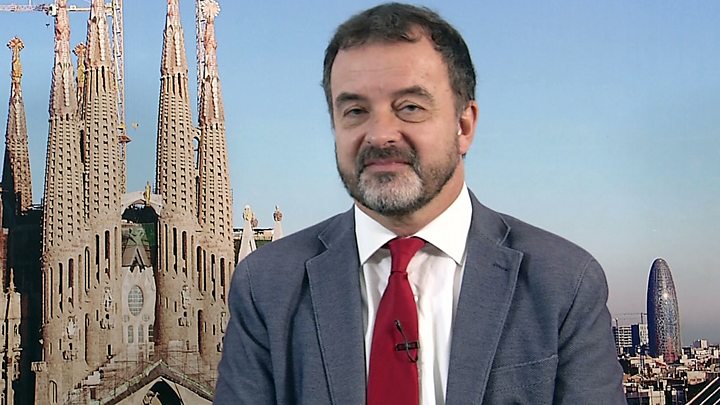Catalonia crisis: Spain’s prosecutors call for Puigdemont’s arrest

Spain’s state prosecutor has requested a European arrest warrant for ousted Catalan leader Carles Puigdemont and four others over their role in a disputed independence referendum.
All five failed to show up at Spain’s high court on accusations of rebellion, sedition and misuse of public funds.
Mr Puigdemont’s lawyer said the climate was “not good” for him to appear.
Nine other sacked members of Catalonia’s regional government did turn up for questioning at the court.
Prosecutors in Madrid asked for eight of them to be held in custody following their testimony.
Spain has been gripped by a constitutional crisis since the referendum was held on 1 October in defiance of a constitutional court ruling that had declared it illegal.
Last week, Spanish Prime Minister Mariano Rajoy imposed direct rule on Catalonia, dissolving the regional parliament and calling local elections for 21 December.
- Catalonia crisis in 300 words
- What next for Spain?
This came after Catalan lawmakers voted to declare the independence of the affluent north-eastern region.
The Catalan government said that of the 43% of potential voters who took part in the referendum, 90% were in favour of independence.
Who are the warrants for?
Mr Puigdemont is currently thought to be in Belgium, and has said he will not return to Spain unless he and four of his fellow sacked colleagues received unspecified guarantees of a fair trial. Belgium’s federal prosecutor has said the law will be applied once the arrest warrant has been received, according to Efe news agency.
In addition to Mr Puigdemont, prosecutors have asked Spain’s high court judge to issue arrest warrants for the following Catalan officials:
- Meritxell Serret, former agriculture minister
- Antoni Comín, former health minister
- Lluís Puig, former culture minister
- Clara Ponsatí, former education minister
Reports suggest some of them requested to appear before the judges at the Madrid court appearance via video conference. Mr Puigdemont’s Belgian lawyer told Reuters news agency that he would co-operate with the authorities in Spain and Belgium.
The deposed leader was seen in a cafe in Brussels while other Catalan government members appeared in court.
What happened earlier in court?
Prosecutors asked the high court judge to jail eight of the nine sacked members who turned up for questioning. They included Deputy Vice President Oriol Junqueras, Interior Minister Joaquim Forn, Foreign Affairs Minister Raül Romeva, and Justice Minister Carles Mundó.
The ninth, Catalonia’s former Business Minister Santi Vila, should be granted a €50,000 ($58,000; £44,000) bail, prosecutors said. He resigned before the Catalan parliament voted for independence on Friday.
The Catalan leaders are yet to be formally charged. They are accused of rebellion – which carries a maximum 30-year jail term – as well as sedition and misuse of funds.
A judge will decide whether the officials should go to jail, pending an investigation that could potentially lead to a trial. She can also grant them conditional bail and order them to surrender their passports.
The court summons had given the sacked leaders three days to pay a deposit of €6.2m to cover potential liabilities.
How are the Catalans reacting?
Mr Puigdemont’s handling of the crisis has drawn criticism among some other Catalan politicians, with left-wing parliamentary deputy Joan Josep Nuet criticising him for creating “yet more bewilderment”.
Despite Mr Puigdemont’s position, the Spanish government insists it has no influence over the country’s judiciary, the BBC’s Tom Burridge in Barcelona says.
But if those Catalan politicians appearing in court are denied bail it will cause further anger among those who want Catalonia to break away, our correspondent adds.
Meanwhile, five other senior members of the Catalan parliament, as well as speaker Carme Forcadell, are facing the same charges but, because of their parliamentary immunity, their cases are being handled by the Supreme Court.
Their hearings have been postponed until 9 November.
- The man who wants to break up Spain
Spain’s central bank warned on Thursday of the “significant risks and economic costs” resulting from the crisis, and that Catalonia’s economy could fall into recession.
Early numbers suggest that the vital tourism sector of the region has already been affected by the ongoing uncertainty.
Source:-BBC